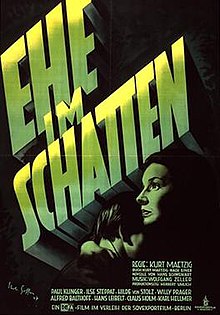Ehe im Schatten
| Ehe im Schatten | |
|---|---|
 |
|
| Directed by | Kurt Maetzig |
| Produced by | Georg Kiaup |
| Written by | Hans Scweikart |
| Starring | Paul Klinger Ilse Steppat |
| Music by | Wolfgang Zeller |
| Cinematography | Friedl Behn-Grund, Eugen Klagemann |
| Edited by | Alice Ludwig |
|
Production
company |
|
| Distributed by | Sovexport-Film |
|
Release date
|
|
|
Running time
|
104 minutes |
| Country | Soviet Occupation Zone |
| Language | German |
Ehe im Schatten (Marriage in the Shadows) is an East German film melodrama. Directed by Kurt Maetzig, tt was released in 1947 by DEFA. The film was described as an "attempt to confront the German people about the morals of the past", being the first film to confront the people about the persecution of the Jews and the atrocities conducted during World War II.
Actor Hans Wieland refuses to divorce his actress wife, Elisabeth, who is Jewish, even as extreme pressure is applied on him by the Nazi authorities. He even takes her to a premiere of one of his films where she is unwittingly introduced to a high Nazi Party official. Upon later discovering that the charming woman at the premiere was in fact Jewish, he orders her arrest. Hans Wieland is given an ultimatum by his former friend Herbert Blohm, now a Nazi official at the Reichskulturministerium (culture ministry), to save himself by divorcing his wife. Knowing that his wife will die in a concentration camp, Hans Wieland returns home and they drink poison in coffee whilst reciting the closing scene of Friedrich Schiller's tragic play Kabale und Liebe together.
The film ends with a dedication to the real-life actor Joachim Gottschalk who committed suicide with his Jewish wife Meta Wolff and their nine-year-old son Michael.
The screenplay was based on the life and suicide of actor Joachim Gottschalk and his family in 1941. However, Kurt Maetzig said of the film, "almost everything in the film is based on what I myself, or my family and friends, have experienced." Indeed, the character of Kurt Bernstein, portrayed by Alfred Balthoff, is strongly based on Maetzig. Maetzig's mother had committed suicide to avoid being caught by the Gestapo. It is Kurt Maetzig's first feature film as director.
...
Wikipedia
